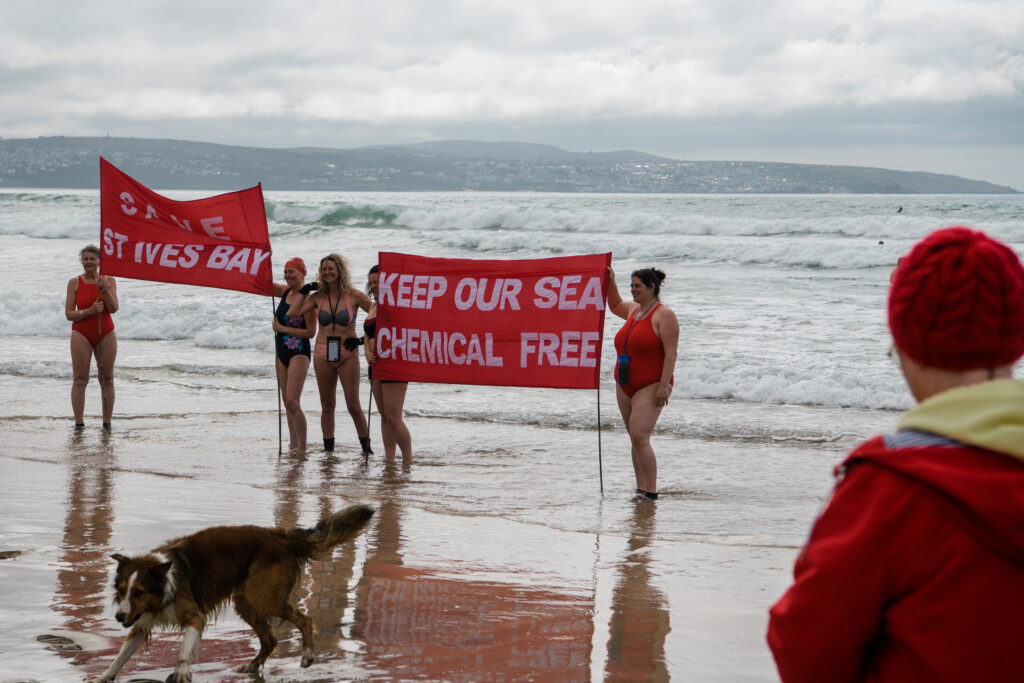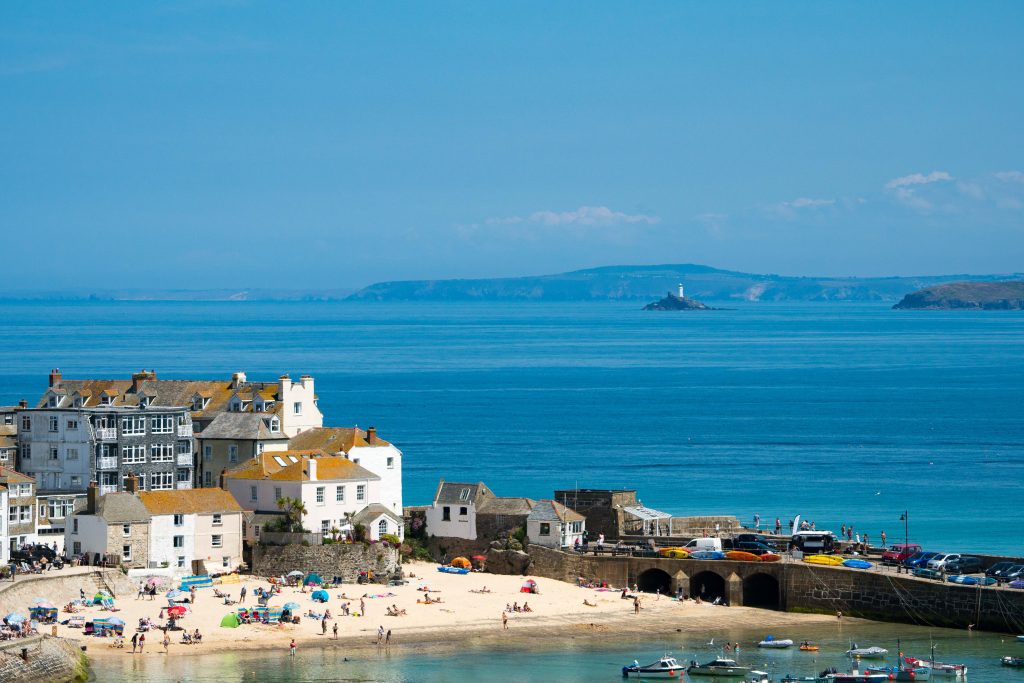By Senara Wilson Hodges, Keep Our Sea Chemical Free and The Cornwall Carbon Scrutiny Group
Local residents are fiercely proud and protective of St Ives Bay. It is counted as one of the UK’s most beautiful coastal environments—flanked by award winning golden beaches and famous for its turquoise sea. The bay is home to a plethora of crustaceans, seaweeds, fish, seabirds, dolphins and a precious grey seal population. Humpback and Minke whales regularly visit as they migrate up the coast. So in March 2023, when rumours started circulating about chemical testing in the bay, many of us couldn’t believe it.
Was it fake news? A joke? Our only source of information was an article in The Times newspaper and that was hidden behind a paywall that most of us couldn’t access. Strange snippets of information started circulating—it was a Canadian Company importing mine waste from China which was then dumped into our sea as some kind of techno fix to the climate crisis. Elon Musk had stumped up a million dollars for Planetary Technologies—the silicon valley sounding company spearheading it all. Most shockingly—there had already been a secret experiment and another was about to happen. The community living around St Ives Bay couldn’t believe this was happening to us. It was so sudden, so totally unexpected and the concepts were so alien. It felt like something out of a sci-fi film.
This was our introduction to Ocean Alkalinity Enhancement—a form of marine geoengineering that introduces alkalinity into the sea to facilitate the drawdown of carbon dioxide from the atmosphere. In our case, Planetary Technologies had added magnesium hydroxide as a slurry to the sewage discharged into St Ives Bay and they were planning to significantly scale up the process. It was an international operation with mine waste shipped from China to Houston in Texas and then on to Cornwall in the far south west of the UK.
We were the last to know. We didn’t know what to do. Who was in charge of all this and how could we express our concerns? Planetary Technologies started pushing out information but where were the independent experts helping to assess it? Where were the regulators? What was the deal with South West Water, the water company facilitating this and, incidentally, a company with one of the worst records for sewage pollution in the country? We felt powerless as individuals—so we started organising. A seasoned environmental activist set up an email group and between us we collated all relevant communications, resources and conversations. Later this group would become The Cornwall Carbon Scrutiny Group. We now had a structure—a way of tracking the changing story we were being told. We saw the contradictions and the inaccuracies and collated the answers to questions put to the company. Between us we unpicked the business model behind Planetary Technologies—it turned out that they had already sold carbon credits to Shopify. This was mind bending—our bay had been monetised and sold without the knowledge or consent of local people. We dug under Planetary’s soothing rhetoric to understand the deep uncertainty and risk posed by Ocean Alkalinity Enhancement. We realised that there was a wider global conversation around geoengineering and the climate crisis as well as the specific issues relating to testing in St Ives Bay.

At the same time, a grassroots group of people living very close to St Ives Bay emerged. We called ourselves Keep Our Sea Chemical Free. There is something about living in such close connection to a natural place that creates an emotional response when it is threatened, especially when that threat comes from people so remote and disconnected from the community. Supporting each other emotionally was just as important as understanding the science. We decided to organise a protest and information day—to make our voices heard and to nurture community solidarity and fellowship. The result was one of the largest local community protests in recent memory. Hundreds of people gathered on the dunes overlooking the St Ives Bay to hear speeches and to express their deep concern for our marine ecosystem. It was a pivotal moment—we now understood that together we might be able to change what had felt inevitable. We were suddenly visible and on the media map with stunning photographs, spokespeople and an expanding support network of scientists and NGOs. But more than all this, the protest was a beautiful celebration of community and nature and it created new and important connections and friendships within our community.
Planetary Technologies had pushed hard to start testing again but The Environment Agency (our UK regulatory body that in the absence of anyone else was suddenly in charge of geoengineering) had demanded a pause and more detailed information. We knew that the uproar from our community made this happen. Our response wasn’t just oppositional—the brilliant Seal Research Trust, based in St Ives Bay, spearheaded efforts to communicate with the regulators and companies involved. They instigated collaborative meetings during which they introduced wider scientific perspectives and concerns. We also talked to journalists, government bodies and submitted information to the UN.
One year down the line and there has been no further testing in the bay. But we have no certainty that this won’t change. Planetary Technologies and South West Water claim that they will start testing again in 2025. Meanwhile our community continues to collaborate, protest and create. We swim, surf, dive, and walk on the beaches and cliffs. We wonder at the magnificent seals, dolphins, whales and seabirds as well as the rock pools and jellyfish. And we introduce this precious habitat to the many visitors who also love this place and are the backbone of the local economy.
As far as we are aware, St Ives Bay is one of the first places that Ocean Alkalinity Enhancement has ever been tested in the open ocean. The fact that it was done in secret by a company that had already sold carbon credits shows the vacuum of regulation and knowledge in which for profit companies are operating.
At the moment, it is only empowered communities that can stop them.





